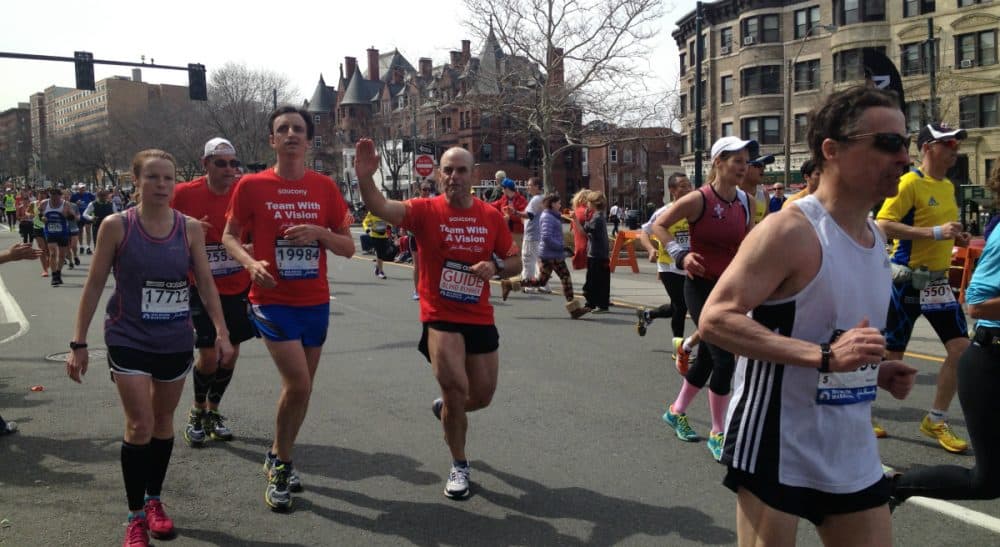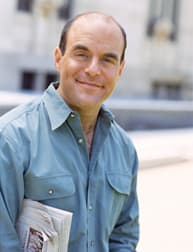Advertisement
Peter Sagal On Running Boston Again And Seeing Cities On Foot

Everyone knows Peter Sagal as the host of the wildly popular NPR News quiz, “Wait, Wait... Don’t Tell Me.” But what you might not know about him is that he’s also an avid distance runner. Today's Boston Marathon will be 49-year-old Sagal's 12th marathon in 10 years.
"This will be my fourth time running Boston," Sagal says. "I did it twice on my own — once in 2007, again in 2011. Then I came back last year, in 2013, to run it with a legally blind runner named William Greer. William and I crossed the finish line just about four minutes before the bombs went off."
This year Sagal is guiding another legally blind runner named Erich Manser, a paratriathlete from the Boston area.
We spoke with Peter Sagal via phone last week. Our conversation, which was lightly edited for space and clarity, follows:
Cognoscenti: Traumatic memories have a way of eclipsing more prosaic memories. Would you say the 2013 marathon is your most memorable marathon?
Peter Sagal: Well you know it’s funny because a marathon, as they say, is not a sprint… it’s a marathon! It’s 26 miles, it’s four hours of running, you’re out there for a long time, a lot of things happen. When I mostly think about last year’s marathon I think about the day, I think about William and his effort and I think about getting to know him. I think about his character and his courage, which is considerable considering what he’s accomplished given his handicap. When I think about the marathon, I also think about the amazing strength he showed. At the end, he was in really bad shape, but I really encouraged him to run that last mile. You don’t want to walk up Boylston Street, after all. And he did it, he pulled it off. And then the bombs went off — which was pretty serious, but at the same time you don’t want to take away his whole experience. He wasn’t just a victim of the Boston bombings, he was a successful Boston marathoner who had his own adventure there. And that should be honored, I think. That’s true of any marathon. I guess what I’m saying is that I’m trying not to give in. Even to call them the "Marathon bombings" gives them some privilege, gives the guys who did it some privilege. Like, now the Boston Marathon means two idiots setting off bombs killing people they didn’t know for reasons that don’t make any sense? No! It’s for all the people who run it, all the people who watch it, and all the history of it. William said the best thing: “It was a great marathon, except for the bombs.” Pretty awesome.
Advertisement
You said in a piece you wrote for Runner’s World that last year's marathon was the first time you ran for a good reason — not for yourself, but for somebody else. Presumably you began running for yourself. Is that a bad reason?
No, no. I mean it’s funny. Runner’s World, when I wrote that piece, was like, “you’re not saying running is bad, are you?” But it was actually shorthand for something that I was going through personally. I’d been running for a long time, running seriously for about 10 years, running off and on my whole life. I’ve done a lot, a lot more than I ever thought I could do, I’ve run all these marathons, I set a very fast personal record [3:09] in a marathon. And after I’d done all of that, for a long time I felt like the pressure went out of my tank, as it were. I was like, why should I keep doing it? What more is there to do? I tried different races: triathlons, Tough Mudders, these other things to sort of mix it up. But at a certain point it’s all about self-indulgence. You’re doing it for the benefits it brings to you: it makes you healthier, it makes you happier. These are good things, nobody’s arguing, but it’s all about yourself: how fast can I run it, how good can I do? And it just seemed ultimately kind of pointless. In the end I really leapt at the opportunity to run with William Greer at the invitation of Team with a Vision because it seemed like a chance to run for somebody else. To actually do this difficult thing but to directly benefit somebody else. I really loved it. It was probably my favorite marathon I’d ever run — the only one that really counted for someone other than me.
I want to ask about dealing with tragedy through humor. I imagine that you and the "Wait, Wait" writers wrestle with that. Is there anything that just isn’t funny?
Oh, there are a lot of things that aren’t funny. And not only do we feel strongly that we shouldn’t do them, floods, disasters, mass deaths — just to give a recent example, the missing Malaysian plane. There was certainly stuff to talk about — the flood of coverage on CNN and the other cable news networks — but the reality is that 250 people are dead, and they died terribly. You can’t forget that. I don’t know that anyone wants to hear a joke about it, and I guess that’s the point. People tune into our show to get a break from tragedy. There are other shows that say, we’re going to take this tragedy and make something great out of it. Our show — we’re not going to talk about the tragedy. We’re going to talk about the guy who tried to smuggle a ferret in his pants. And I think people appreciate that.
You travel a lot. How do you find the time to train? Do you explore cities by running in them?

I do. I’m sitting here at the airport talking to you with a bag by my feet: at the bottom of the bag are a pair of shoes, socks, shorts and a singlet. Tomorrow morning when I wake up in Sacaramento, I’m going to go for a run. I don’t know how far I’ll get, but I’ve run all over the country, pretty much wherever I’ve visited. When I have a chance I go. It’s very important to me and it’s a great way to see where I’m going. For anyone who travels a lot, there’s a tendency to fall into this habit of going from airport to hotel to conference venue, or in my case, to performance center, and then back to the airport and home. And you have no idea where you’ve been. In fact I remember once I was in Virginia Beach, Virginia. Our hotel and performance center were in this new shopping center that had just been built. I remember walking into the middle of it, and turning 360 degrees, and looking at a P.F. Chang’s, and a Banana Republic, and a Gap and thinking to myself: there’s nothing in my field of view that would indicate where I am in America right now. There was no indicator. I couldn’t tell. So running, even if it’s through ugly parts of town — at least I know where I’ve been.
I’m curious to know whether you integrate your news consumption into your running. One of my favorite excuses for myself when I’m in my more sedentary periods is that I just don’t have time, I have to get up early, read the newspaper, listen to the radio, etc. Do you do both at the same time or do you try to keep them separate?
Well the thing is that if you’re going to run and you’re a busy person and there are a lot of distractions, you just need to get out and run. There’s no trick to it. One person said to me, "well, I love to watch movies, so I run on the treadmill and watch movies." That’s fine, and if that gets you running then that’s great. But my thing is: if you’re going to run, run. Be there. Now. You know, be mindful of what you’re doing. So what I try to do — and I don’t always succeed, I didn’t succeed this morning — is get up, go for a run and then start my day. That’s partly because I feel better if I’ve gone running in the morning, and that’s partly because if I don’t do it before everything else starts I won’t do it. Some people can manage: they come home, go for a run, they can do it. That’s awesome, they look forward to it, to take a break, to wake themselves up. I usually run with friends, so it means I’m not doing anything else, I’m not listening to anything. I just talk with my friends and concentrate on running. Sometimes I will listen to podcasts or music or something. But also I just believe in just getting out there and seeing what it’s like to be in your own head for a while.